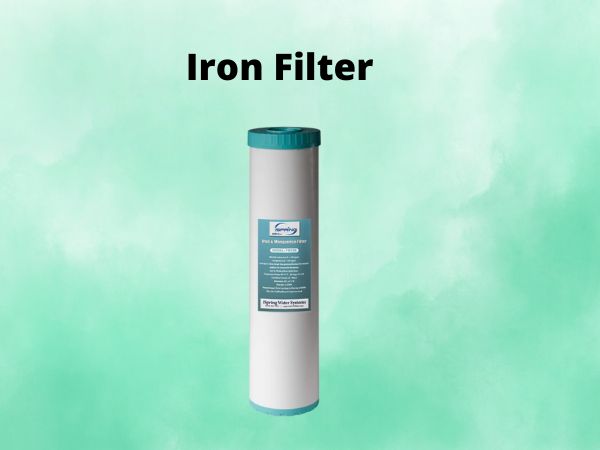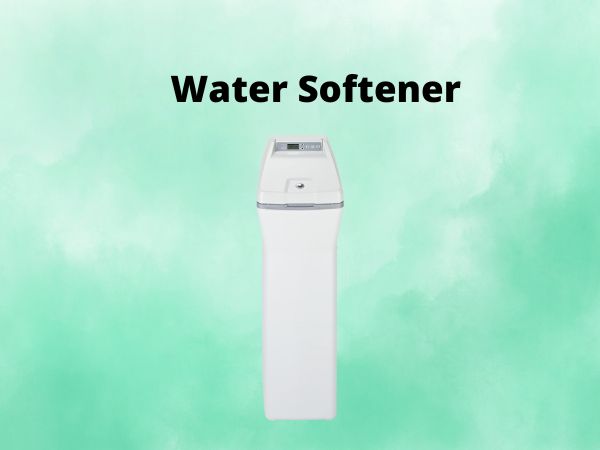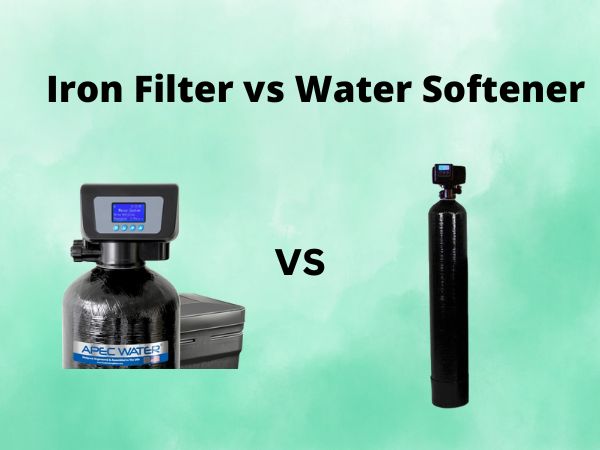Iron Filter vs Water Softener [A Comprehensive Comparison]
Clean, safe water is essential for our daily lives – from drinking and cooking to bathing and cleaning. However, many households face challenges with water quality, such as the presence of iron or hard water. These issues can lead to various problems, including stained fixtures, clogged pipes, and even potential health risks. Fortunately, there are solutions available in the form of iron filters and water softeners.
Table of Contents
Here is an in-depth comparison table for Iron Filter vs Water Softener
| Feature | Iron Filter | Water Softener |
| Purpose | Removes dissolved and particulate iron from water | Removes hardness minerals (calcium and magnesium) from water |
| Operating Principle | Oxidizes iron, causing it to precipitate and be filtered out | Ion exchange process that traps hardness minerals onto a resin bed |
| Contaminants Removed | Iron (ferrous and ferric) | Hardness minerals (calcium and magnesium) |
| Effectiveness on Hardness | Does not address water hardness or remove hardness minerals | Highly effective in removing hardness minerals and softening water |
| Effectiveness on Iron | Highly effective in removing both dissolved and particulate iron | Does not remove iron from water |
| Types | Oxidizing filters (air injection, chlorine injection, potassium permanganate), greensand filters, manganese filters | Salt-based softeners, salt-free conditioners/descalers |
| Maintenance Requirements | Backwashing, media replacement (depending on the type), monitoring for clogs | Salt or potassium chloride replenishment, resin bed cleaning or replacement |
| Water Quality Impact | Improves water quality by reducing iron stains, discoloration, and potential plumbing/appliance damage | Improves water quality by preventing scale buildup, improving soap and detergent performance, and prolonging appliance lifespan |
| Efficiency | Efficient in removing iron, but does not address hardness | Efficient in softening water and removing hardness minerals |
| Installation | Relatively simple installation, typically point-of-entry | More complex installation, often requiring plumbing modifications and a drain line |
| Space Requirements | Compact size, suitable for most households | Larger size, may require dedicated space |
| Initial Cost | Lower initial cost compared to water softeners | Higher initial cost, especially for larger systems |
| Operating Costs | Replacement of filter media, electricity costs for backwashing | Salt or potassium chloride purchases, electricity costs for regeneration |
| Wastewater Discharge | Minimal wastewater discharge during backwashing | Wastewater discharge during regeneration cycles |
| Byproducts | Iron-rich wastewater during backwashing | Brine solution discharge during regeneration |
| Combination Systems | Can be combined with a water softener for comprehensive treatment | Can be combined with an iron filter for comprehensive treatment |
Two of the most common water quality issues faced by homeowners are iron and hard water. Iron can cause rust-colored stains, an unpleasant metallic taste, and can potentially damage plumbing systems. On the other hand, hard water, which contains high levels of dissolved minerals like calcium and magnesium, can lead to scale buildup, soap scum, and inefficient appliance performance.
Understanding Iron in Water
What is iron?
Iron is a naturally occurring mineral found in various forms, including ferrous iron (dissolved) and ferric iron (undissolved particles). While iron is an essential nutrient for human health, excessive levels in water can cause significant problems.
Sources of iron in water
Natural sources
Iron can enter water supplies through natural processes, such as the weathering of iron-rich rocks, minerals, and soil. Groundwater, which is a common source of drinking water for many households, can pick up iron as it travels through underground formations.
Human-made sources
In some cases, human activities can contribute to increased iron levels in water. For example, iron pipes used in older plumbing systems can corrode over time, releasing iron into the water supply. Industrial processes, mining activities, and even well-drilling operations can also introduce iron into water sources.
Effects of iron in water
While iron in water is generally not considered a health hazard at low levels, it can cause several problems. High iron concentrations can lead to rust-colored stains on laundry, fixtures, and appliances. It can also contribute to an unpleasant metallic taste and odor in water, as well as discoloration. Additionally, iron can accumulate in pipes, leading to reduced water flow and potential clogs.
What is an Iron Filter?
How does an iron filter work?
An iron filter is a water treatment system designed to remove dissolved and particulate iron from water supplies. These filters work by oxidizing the iron, causing it to precipitate out of the water. The precipitated iron is then captured by the filter media, preventing it from entering the household water supply.

Types of iron filters
Oxidizing filters
Oxidizing filters use various methods to oxidize the iron, such as air injection, chlorine injection, or the addition of potassium permanganate. Once oxidized, the iron particles are then filtered out by a media bed, typically composed of materials like greensand or manganese dioxide.
Greensand filters
Greensand filters are a type of oxidizing filter that utilizes a special media called greensand, which contains glauconite, a naturally occurring mineral that acts as an oxidizing agent. As water passes through the greensand bed, the iron is oxidized and filtered out.
Manganese filters
Manganese filters are similar to greensand filters but are designed specifically to remove both iron and manganese from water supplies. These filters use a media bed containing manganese dioxide, which effectively oxidizes and filters out both contaminants.
Advantages of iron filters
Iron filters offer several advantages, including:
- Effective removal of dissolved and particulate iron
- Improved water quality with reduced staining and discoloration
- Preservation of plumbing systems and appliances
- Low maintenance requirements
- No need for added chemicals or salt
Disadvantages of iron filters
While iron filters are highly effective, they do have some drawbacks:
- Limited effectiveness for removing other minerals or hardness
- Potential for clogging if not maintained properly
- Higher initial cost compared to some other water treatment options
- Ongoing replacement of filter media may be required
Understanding Water Softeners
What is water hardness?
Water hardness refers to the presence of dissolved minerals, primarily calcium and magnesium, in water. These minerals can cause scale buildup, interfere with soap and detergent performance, and contribute to the premature failure of water-based appliances and plumbing systems.
How does a water softener work
A water softener is a device that removes calcium and magnesium ions from hard water through a process called ion exchange. The softener contains a resin bed, which is composed of tiny, negatively charged beads. As hard water passes through the resin bed, the calcium and magnesium ions are attracted to and trapped by the resin beads, effectively “softening” the water.

Types of water softeners
Salt-based softeners
The most common type of water softener is a salt-based system. These softeners use sodium or potassium chloride (salt) to regenerate the resin bed, replacing the trapped calcium and magnesium ions with sodium or potassium ions. Salt-based softeners require periodic regeneration and the addition of salt to maintain their effectiveness.
Salt-free softeners
Salt-free water softeners, also known as descalers or conditioners, do not remove hardness minerals from the water. Instead, they use various technologies, such as electromagnetic or catalytic processes, to alter the structure of the minerals, preventing them from forming scale. While these systems do not remove hardness, they can help mitigate some of the negative effects of hard water.
Advantages of water softeners
Water softeners offer several benefits, including:
- Elimination of scale buildup in plumbing and appliances
- Improved soap and detergent performance
- Softer feeling water for bathing and laundry
- Prolonged lifespan of water-based appliances and plumbing systems
Disadvantages of water softeners
Despite their advantages, water softeners also have some drawbacks:
- Ongoing need for salt or potassium chloride for regeneration
- Potential for increased sodium or potassium levels in the water
- Higher initial cost and installation requirements
- Wastewater discharge during regeneration cycles
Iron Filter vs Water Softener
Similarities
While iron filters and water softeners serve different purposes, they share some similarities:
- Both are water treatment systems designed to improve water quality
- Installation and maintenance are required for both systems
- Initial and ongoing costs are associated with each solution
Differences
However, there are significant differences between iron filters and water softeners:
- Iron filters target the removal of iron, while water softeners address water hardness
- Water softeners use an ion exchange process, while iron filters rely on oxidation and filtration
- Iron filters do not remove hardness minerals, while water softeners effectively eliminate them
- Water softeners may increase sodium or potassium levels in the water, while iron filters do not
When to use an iron filter
An iron filter is the appropriate solution when the primary water quality issue is high levels of iron. If your water has a reddish or orange tint, leaves rust stains on fixtures and laundry, or has an unpleasant metallic taste, an iron filter can effectively address these problems. However, it will not soften the water or remove other minerals.
When to use a water softener
A water softener is the ideal choice if you are dealing with hard water issues, such as scale buildup, ineffective soap and detergent performance, or potential damage to appliances and plumbing systems. Water softeners effectively remove the minerals that cause hardness, but they will not address iron or other contaminants.
Combination Systems
Benefits of a combined system
In some cases, households may face both iron and hardness issues simultaneously. In such situations, a combination system that includes both an iron filter and a water softener can provide a comprehensive solution. The benefits of a combined system include:
- Effective removal of iron and hardness minerals
- Improved water quality for various household uses
- Protection of plumbing systems and appliances
- Elimination of staining and scale buildup
Drawbacks of a combined system
While a combined system offers thorough water treatment, it also comes with some drawbacks:
- Higher initial cost and installation complexity
- Increased maintenance requirements
- Larger space requirements for the equipment
- Potential for higher operating costs due to the need for salt/potassium chloride and filter media replacement
Maintenance and Costs
Iron filter maintenance
Iron filters require periodic maintenance to ensure optimal performance and longevity. This may include backwashing the filter media, replacing the filter cartridges or media bed, and monitoring the system for any clogs or issues. Proper maintenance can help extend the lifespan of an iron filter and ensure consistent water quality.
Water softener maintenance
Water softeners also require regular maintenance, primarily in the form of salt or potassium chloride replenishment and occasional resin bed cleaning or replacement. Neglecting maintenance can lead to decreased softening efficiency and potential system failures.
Cost comparison
When comparing the costs of iron filters and water softeners, several factors come into play:
- Initial cost: Water softeners generally have a higher upfront cost compared to iron filters, particularly for larger or more advanced systems.
- Operating costs: Water softeners require ongoing salt or potassium chloride purchases, while iron filters may need periodic media replacement, depending on the type of filter.
- Installation costs: Both systems may require professional installation, with water softeners often requiring more extensive plumbing modifications.
- Maintenance costs: Regular maintenance, such as backwashing, resin cleaning, and media replacement, contributes to the overall cost of ownership for both systems.
It’s essential to consider your specific water quality needs, household size, and budget when evaluating the costs of an iron filter or water softener.
FAQs
1. Can an iron filter remove water hardness?
No, iron filters are designed specifically to remove iron from water. They do not address water hardness or remove minerals like calcium and magnesium that cause scale buildup.
2. Do water softeners remove iron?
Water softeners are not designed to remove iron from water. They primarily target the removal of hardness minerals, such as calcium and magnesium, through an ion exchange process.
3. Can I install both an iron filter and a water softener?
Yes, it is possible to install a combination system that includes both an iron filter and a water softener. This approach can provide comprehensive water treatment by addressing both iron and hardness issues simultaneously.
4. How often do iron filters and water softeners need to be maintained?
The maintenance frequency for iron filters and water softeners varies depending on factors such as water usage, system size, and water quality. Iron filters may need backwashing or media replacement every few months to a year, while water softeners typically require salt or potassium chloride replenishment and occasional resin cleaning or replacement.
5. Are there any alternatives to traditional iron filters and water softeners?
There are alternative water treatment solutions, such as salt-free water conditioners, reverse osmosis systems, and whole-house filtration systems. However, these alternatives may have limitations in addressing specific water quality issues like iron or hardness. It’s essential to evaluate your water quality and needs to determine the most appropriate solution.
Conclusion
Choosing between an iron filter and a water softener ultimately depends on the specific water quality issues you are facing. If your primary concern is the presence of iron in your water supply, an iron filter is the most effective solution. It will effectively remove dissolved and particulate iron, preventing stains, discoloration, and potential damage to your plumbing and appliances.
On the other hand, if you are dealing with hard water problems, such as scale buildup, soap scum, and inefficient appliance performance, a water softener is the ideal choice. These systems use an ion exchange process to remove calcium and magnesium ions, effectively softening the water and mitigating the negative effects of hardness.
In some cases, households may need to address both iron and hardness issues simultaneously. In such situations, a combination system that includes an iron filter and a water softener can provide a comprehensive solution, albeit at a higher cost and with increased maintenance requirements.
Regardless of your choice, it’s crucial to consider factors such as the initial cost, ongoing operating expenses, and maintenance requirements when selecting a water treatment system. Proper installation and regular maintenance are also essential to ensure the system’s longevity and optimal performance.
By understanding the differences between iron filters and water softeners, you can make an informed decision that best suits your household’s water quality needs and budget. Investing in the right water treatment solution can lead to cleaner, safer, and more enjoyable water for drinking, bathing, and household use.


![10 Best Frigidaire Refrigerator Water Filters [In 2025]](https://bathroomexplorer.com/wp-content/uploads/2024/04/Best-Frigidaire-Refrigerator-Water-Filter.jpg)
![10 Best Iron Filters for Well Water [In 2025]](https://bathroomexplorer.com/wp-content/uploads/2024/04/Best-Iron-Filters-for-Well-Water.jpg)
![3 Stage Water Filter vs Reverse Osmosis [Which One Should You Choose?]](https://bathroomexplorer.com/wp-content/uploads/2024/04/3-Stage-Water-Filter-vs-Reverse-Osmosis.jpg)
![What Is The Best Shower Filters for Hard Water [IN 2025]](https://bathroomexplorer.com/wp-content/uploads/2024/04/Best-Shower-Filters-for-Hard-Water.jpg)
![What Is The Best Water Filter Jugs [IN 2025]](https://bathroomexplorer.com/wp-content/uploads/2024/04/Best-Water-Filter-Jugs.png)
![The 10 Best Sink Faucet Water Filters [IN 2025]](https://bathroomexplorer.com/wp-content/uploads/2024/04/Best-Sink-Faucet-Water-Filters.jpg)